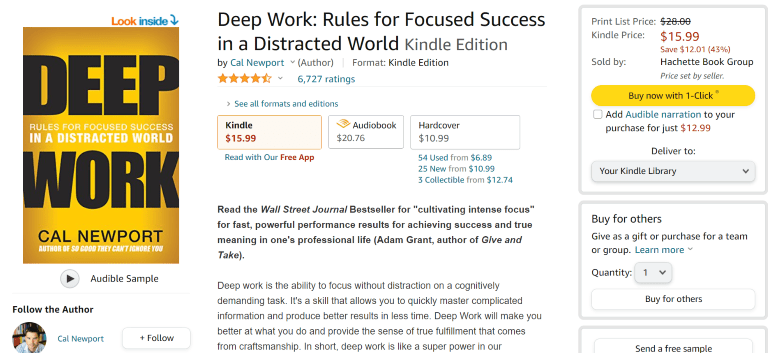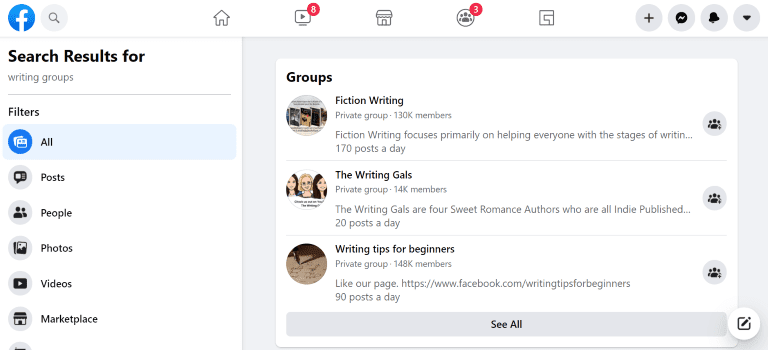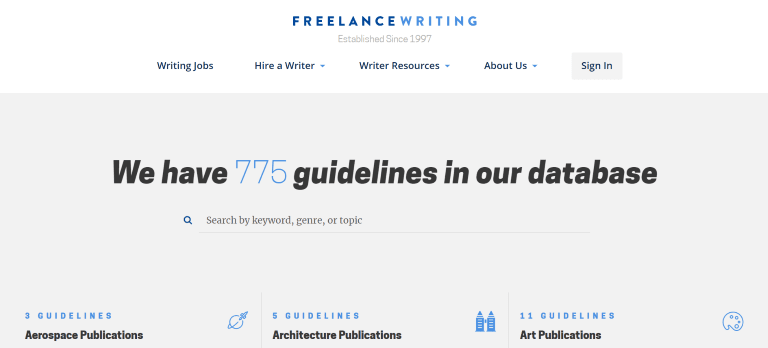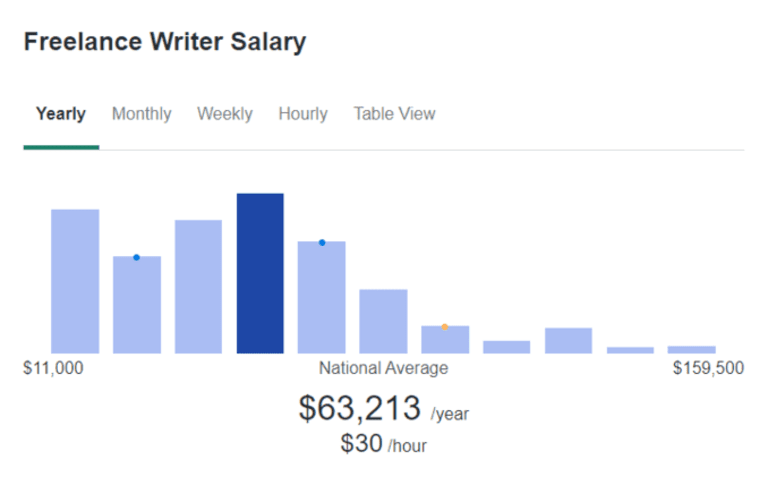You’re here because you want to learn how to become a writer.
A quick Google search led to mountains of advice, leaving you with more questions than when you started!
But you’re determined to figure out, once and for all, how to grow your talent on a career path that not only puts food on the table but changes your life in ways you can’t put a price on.
In the simple steps below, you’ll learn how to decide what kind of writing to focus on and where to find the best writing jobs once you do.
Ready to take those first steps toward becoming a professional writer?
Let’s dive in.
How to Become a Writer in 9 Steps
Who doesn’t love a step-by-step approach to making great things happen?
No one’s saying it’ll happen overnight. But, by giving each of the following steps your full and patient attention and taking action every day, you’ll make steady and measurable progress.
This is how you go from being an aspiring writer to landing a great writing job.
Ready?
1. Choose a Path
Your decision to become a writer is just the beginning. When it comes to professional writing for an income, you have several rewarding paths to choose from:
- Blogging: Build an audience by writing on your own platform (or guest post on other blogs)
- Freelance writing: Write high-quality content for clients and publications
- Copywriting: Write marketing copy and assist with branding
- Writing nonfiction books: Share knowledge and earn royalty income
- Writing fiction: Tell stories and earn royalty income
- Ghostwriting: Merge your skill with another’s voice to write books or create viral content
- Journalism: Write for a newspaper and/or magazines
Some of these probably excite you more than others. And you wouldn’t be the first writer to try more than one path before settling on the best fit.
How do you decide where to begin?
- Learn as much as you can about the paths that interest you.
- Talk to experienced bloggers, journalists, ghostwriters, etc.
- Try your hand at writing jobs for different paths (part-time).
Whatever you try, be honest about your inclinations. When you’re writing what you love (or what you don’t), it shows.
2. Get Over Yourself and Just Get Started

You’re sitting there in front of a blank page, wondering, “Why did I think becoming a writer would be easy? How do I start a writing career if I can’t think of what to write?”
Both are fair questions. The first step to writing more easily, though, is to stop self-editing in your head before the words get a chance to come out.
Get over the idea that every sentence you write has to be perfect. Your fear of making mistakes, or of making something less than perfect, is the monster behind writer’s block and procrastination.
But to be a great writer, you need something stronger: Resilience.
It’s in there, I promise.
And it’s what makes it possible for all types of writers to face harsh criticism, to get back up, and to keep on writing.
3. Write Every Day
Writer’s write. And professional writers write every day.
That might sound inflexible. But those who take their writing seriously make time for it in their daily routines.
If it’s something you only do when you feel inspired, it’s a hobby, not a career.
Unless you’re nocturnal, you probably have more energy in the morning than you do in the evening; carve out some of that time for your new writing habit.
Here are some ideas on what to write:
- Journal entries
- Blog posts and ideas
- Emails or letters
- Freewriting with prompts
- Creative writing exercises
Along with using a habit tracker app (like this one), many writers find it helpful to set a minimum word count target for the day – or a minimum number of minutes spent writing.
Apps like PomoDoneApp use the Pomodoro technique to help you accomplish more in manageable chunks of time.

Start with something you know will be manageable for you, even when you’re tired and your brain just doesn’t wanna (because those days will come).
But a year from now, if you stick with your daily practice, you’ll have sharpened your writing skills and learned how to keep going when the going gets tough. And both will serve you well.
4. Focus on “Deep Work”
In order to do your best work, you need a writing space that’s free of distractions. Only when you immerse yourself in your writing can you enter a flow state, where the “deep work” happens.
It isn’t so much about working “smarter, not harder.” It’s working smarter and harder to get the best possible results. And that doesn’t happen when you multitask.
It happens when you take the following steps seriously (including #6):
- Clarify your goals and prepare. Know what you want to accomplish before each day, each week, each month, etc., begins.
- Automate what you can. Use project management tools to automate your workflow and free up more time for deep work.
- Focus on one thing at a time. Choose one task and give all your attention to that for 40 minutes to an hour or two.
- Create a daily ritual. Create a dedicated space and allocate a specific time period for your daily deep work sessions.
- Silence social media. It’s a distraction you don’t need. Allocate separate, small blocks of time for this.
- Quit when you’re done. No points for overdoing it. Your brain needs quality rest to do quality written work.
- Read the book, Deep Work: Rules for Focused Success in a Distracted World, by Cal Newport, and keep it as a helpful reference and reminder.

5. Read More
Being a good reader is essential to being a good writer. And what you choose to read will often influence the way you write.
With that in mind, we’d like to recommend a few good books on writing:
- On Writing Well: The Classic Guide to Writing Nonfiction by William Zinsser (best book on the mechanics of the language)
- Save the Cat by Blake Snyder (best book on story structure)
- Story Engineering by Larry Brooks (storytelling and novel writing)
- CA$HVERTISING: How to Use More than 100 Secrets of Ad-Agency Psychology to Make Big Money Selling Anything to Anyone by Drew Eric Whitman (structure and mechanics for copywriting)
- On Writing: A Memoir of the Craft by Stephen King (best book on being a writer)
You don’t know what you don’t know yet. And you’ve yet to discover how the books you read will change your path as a writer.
One way to make sure you get some quality reading in during the year is to make yourself a monthly reading list with books in the following categories:
- Books on the craft of writing
- Books like the ones you want to write
- Books you read for fun
Your list doesn’t have to look like every other writer’s, but don’t underestimate the value of a sincere recommendation.
6. Always Be Learning and Leveling Up
If you’re wondering what kind of education you need to be a better writer, we have some good news: you don’t need a college degree to earn a good income with your craft (though, it doesn’t hurt).
What you do need is to keep learning and developing as a writer.
Aside from reading good books, there are other ways to continue your education:
- Take online courses on platforms like Udemy, Skillshare, or MasterClass.com
- Level up with certification programs like those offered by Smart Blogger
- Take a college writing course or earn a writing degree, such as an MFA, a Bachelor’s degree in English, Literature, or Journalism, or an industry-focused Associates degree
- Submit your best work to writing contests
- Set up a writer’s website and learn how to develop it into an asset
As you’ll see in the next tip, you can learn plenty from your fellow writers as well as from readers (particularly those who read the kinds of written content you want to write).
Leveling up your interaction with them should be an integral part of your plan.
7. Join a Writing Community

No writer is an island. That’s especially true if you plan on getting paid.
It’s never too early to join a writing community and to start learning from other members and sharing what you know.
- Facebook groups for writers (Search “writing,” and you’ll find plenty)
- Facebook groups for your chosen genre or writing path
- LinkedIn groups
- Local writing groups (Look up “[nearest city] writing groups”)
- Online communities like CampNaNoWriMo and Critique Circle
- Networking events for writers like the Writer’s Digest Annual Conference
Put yourself in situations where you’ll meet other writers, particularly those drawn to the same paths that interest you.
Whatever stage you’ve reached, you have valuable insights to share, and so do they.
Learn what you can to help each other grow.
8. Find Paid Writing Opportunities
Once you’re ready to start writing for money, it’s time to get acquainted with all the best places to find paid writing opportunities:
- Job boards: Problogger, FlexJobs, and FreelanceWriting.com
- LinkedIn: in writing or industry-specific groups
- Facebook: in writing or niche-specific groups
- Writer guidelines for magazines and book publishers
- Social media channels like Twitter and Instagram

Make time for daily checks of job boards.
Look through guidelines for magazines and publishers that interest you. And allocate some time for job searching on social media channels where you’ve built connections with fellow writers, editors, and publishers.
9. Cultivate Credibility
Once you’ve received your first payment from a client, don’t forget to ask for a testimonial. Think of it as a way to ensure you’ve met all their expectations.
Each well-crafted testimonial benefits you in the following ways:
- Shows client satisfaction, gratitude, and even loyalty
- Articulates exactly how you benefited each client
- Acts as a referral to build trust in potential clients
- Gives you a chance to increase a good client’s visibility
- Helps you discover areas that need improvement
With that last one, you may have to read between the lines and ask your client for clarification. But none of these benefits come without asking.
And when you’re starting out, it’s an easy thing to forget.
If you’re worried the client will be annoyed by your request, we can tell you (from experience on both sides) if your client is happy with your work, they’ll be happy to write something complimentary about it.
If they’re not sure exactly how to write a testimonial, you can even write one for them to review and approve.
Frequently Asked Questions
Do Writers Get Paid Well?
It’s not hard to find success stories of writers who earn six figures (or more) with their craft. Famous authors like Liane Moriarty and Stephen King come to mind.
That said, no writer starts out with the promise of a six-figure income, no matter how good they are. And it’s best not to quit your other job until you’ve met one of the following enviable conditions:
- You’re consistently earning enough with your writing to replace the income you’d lose, or
- You have solid evidence your writing income, plus any other household income, will more than make up for it.

Do I Need a Writer’s Website to Be Successful?
While you can host your writing profile on sites like Contently or LinkedIn, you wouldn’t own the platforms. With a self-hosted website, you can create a profile on your own piece of online real estate.
But those aren’t the only benefits of owning your own platform:
- You can start a blog of your own with niche-focused content
- You can earn affiliate income with your blog posts
- You can create stylized links to your writing samples and portfolio
Your writer’s website displays your qualifications and gives future clients a taste of your personality, too.
Don’t worry, maintaining an online platform doesn’t have to be a full-time job. And the sooner you create one, the sooner you can share your new online address.
How Do I Start a Writing Career When I Still Have a Job?
You don’t need to be unemployed or have loads of free time to get started on building a profitable writing career.
Whatever path you choose, you can set aside time for the following:
- Daily writing
- Skimming job boards
- Creating a writer website
- Taking an online class
- Connecting with other writers
Do what you can every day to get closer to your writing goals.
Final Takeaways on How to Become a Writer
Whatever writing path you choose, nothing happens until you take action.
The secret to becoming a successful writer isn’t magic or destiny. It lies in what you do consistently, even when you’d rather do something else.
Take a moment now, look through the steps again, and jot down some ideas for this week to get the wheels in motion.
Then hit the Freelance Writing Hub and read up. Or make time for some of our favorite podcasts for writers.
Setting S.M.A.R.T. goals is just the beginning. Smart habits are what will get you there.
The post How to Become a Writer: 9 Simple Steps You Can Take in 2021 appeared first on Smart Blogger.


No comments:
Post a Comment